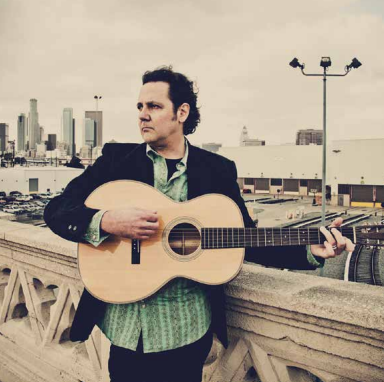Spotlight: Marc Ford

When Marc Ford launched a Kickstarter effort in late January to fund the recording of his latest solo album, he offered up this thought: “Imagine if Jimi Hendrix was signed to Sun Records, but he made a record at Chess. If we can get an album that sounds anything like that, I’ll be happy.”
Just a few hours after the late-February sessions came to a close, the soft-spoken guitarist/singer/songwriter answers with a laugh when asked if his expectations were met: “Yeah, that Jimi thing I was describing was a feeling rather than a sound, and I think we got it. To me, Jimi was all about the freedom to explore places that people either feared or didn’t even know existed. This record was about taking the traditional, gut-level blues thing and really stretching out and experimenting with it—not being locked into anything.”
For some, the notion that Ford even needs a Kickstarter effort to support an album might come as a surprise— after all, he played guitar with The Black Crowes during one of their most commercially successful and musically adventurous periods. But Ford’s time with the Crowes was just one chapter of the almost 50-year-old musician’s evolving story, and while his solos on tunes such as “Sting Me” and “Sometimes Salvation” may be certified guitar-geek porn, there aren’t any royalty checks rolling in. As the guitarist explains, he was an employee during his tours of duty with the Crowes—a valued hired hand, but a hired hand nonetheless.
But these days, Ford doesn’t waste a lot of time looking in the rearview mirror. And if he does wax poetic on his past mistakes, it’s only to remember the lessons he learned during the dark years of the late ‘90s, when he was dismissed from the Crowes while he struggled with a crumbling marriage and a heroin habit.
“Sometimes it takes waking up in an intensive care unit to get your attention,” says Ford. “I’d hit rock bottom and realizing that forced me to take an inventory: ‘What’s going on here?’ It was a difficult situation, but it forced me to do something else.”
One key “something else” was embracing religion in his life. He talks freely about spirituality with the same low-key, Southern-California drawl that he uses to discuss fuzz pedals, but there’s no question of how serious Ford is when he admits: “I have more faith in God than I do in myself, you know? When you’re at the point where you’re unable to do for yourself, then you have to allow other things to enter into your life, and I’m grateful to be here now.”
Over the years since his recovery, Ford has shared the stage with the likes of Ben Harper, Booker T. Jones and Mike Campbell, but he’s just as passionate about gigs in small, local clubs. “That was something I came to a while back,” he says. “And once I did, it was clear as day: I need to do this for me. I love making music when nobody’s listening, too, you know? It’s a personal thing. For me, that’s my connection to God.” (He briefly rejoined The Black Crowes during their highprofile reunion run in 2005 and 2006 but ultimately left the group to protect his sobriety.)
These days, Ford savors his everyday life. He enjoys making music with his family and recently produced and played on his wife Kirsten’s new solo album, I Belong to You, and has collaborated with his son Elijah—who also has his own music cooking—both onstage and in the studio.
Ford’s spiritual quest also led him to singer-songwriter Chris Lizotte, who shepherds the music program at the Church by the Sea in Laguna Beach. Besides Sunday morning worship services, Ford has worked as a producer and guitarist on two albums with Lizotte. Then there’s another kind of church—his gritty, greasy, funky-to-the-bone work with the Neptune Blues Club, an ensemble boasting bassist John Bazz, drummer Anthony Arvizu and Mike Malone on keys and harmonica. The group had already booked time at San Francisco’s Tiny Telephone studios with John Vanderslice behind the control board when the Kickstarter was announced. In fact, the quartet was tucked into a van and headed up the coast when the fundraising effort was still shy of its goal. “Yeah, well, you gotta have faith,” Ford reveals. The band went in with very little preparation and only four days to lay down the basic tracks.
He shrugs it off. “We’ve all been playing for a pretty long time; the details get worked out in a second. Finding the heart of the song is the real challenge.
“But that’s what the Neptune Blues Club has always been about,” he continues. “It’s more than just the blues. It’s like the Elks Club getting together, only we play more than talk.”
And playing is exactly what they did, working through tunes that range from deep roots and dirty blues to that Hendrixian territory mentioned earlier, including a new original called “Deep Water.”
“When we recorded that one, it was a powerful moment,” says Ford. “Everybody in the studio felt it. Mike looked at me and said, ‘We ought to call this album Deep Water. Something just happened here.’”



















